
Most people do not have to go to court after a car accident. However, it may be necessary in some cases. Your Boca Raton car accident lawyer can explain what to expect and if your case might need to go to court.
After a serious injury crash, the hope is that the other driver’s insurance company will cover the damages, and you can resolve everything quickly. This is not always how things go, though. Sometimes, you might have to fight for the compensation you deserve in court.
Sometimes, You May Need to Sue for Serious Injuries
In a fault-based state, you can sue the at-fault driver for your injuries regardless of their severity.
In states with no-fault insurance, such as Massachusetts and Florida, this process works a little differently. Your own insurance, your Personal Injury Protection (PIP) coverage, will pay for your medical bills and lost wages regardless of who caused the crash. However, they will only pay up to the policy maximum.
If you have serious injuries, you can step outside the no-fault system and sue the at-fault driver. Each state has its own laws that define “serious injury.” If the at-fault driver’s insurer refuses to offer a fair settlement or outright denies that its policyholder is liable, you may have to file a lawsuit and go to court to get the compensation you need.
we are here for our clients and their legal needs, with proficiency in a broad range of fields. GET A FREE CONSULTATION
The Insurer May Deny Your Claim or Refuse a Fair Settlement
Most victims can settle their car accident claims without going to court. However, this can be difficult when insurers dispute fault, downplay the severity of injuries, or refuse to make a fair offer. Suing and taking the case to court might be the only option.
Some ways an insurance company might force you to file a personal injury lawsuit include:
- It claims you caused the crash.
- It says your injuries are not serious enough to sue in a no-fault state.
- It claims your injuries are not related to the crash.
- It believes your medical treatment was unnecessary.
- It undervalues your expenses, pain and suffering, or long-term effects.
When you file a lawsuit, it puts pressure on the liable driver and their insurance company. This often encourages better settlement offers, and these cases often still settle without needing to go to court.
The Other Driver Is Suing You for Compensation
Sometimes, the other driver might blame you for the accident and file a lawsuit against you. This could occur when:
- The police report and/or insurance company determines you are at fault.
- The other driver suffered serious injuries and is pursuing damages.
- There is evidence to show you caused the crash, but your insurance company refuses to settle.
When this occurs, your insurance carrier may provide a lawyer to handle your case. They will represent you and fight on your behalf. However, you may still need to give a deposition, answer interrogatories, and possibly testify at trial.
with compassionate advice and professional assistance. CALL US TODAY
There Are Disputes Related to Comparative Fault and Shared Liability
Sometimes, a driver and their insurer may admit they caused the accident, but they allege you contributed to it in some significant way. When this occurs, your state’s shared fault laws would dictate if you could recover compensation and how your contribution to causing the crash would affect your payout.
Your personal injury lawyer will know how the comparative fault laws work in your state and how to best defend against this type of allegation. Many states have a modified comparative negligence law where parties can share fault in a crash, but the victim’s payout would go down by the percentage of fault assigned to them.
If each side blames the other or the liable party believes the victim contributed to causing the crash, this could lead to litigation. A trial may be necessary to determine what happened, assign fault, and award compensation when appropriate.
We look forward to hearing from you and helping you with your legal needs. CALL FOR A FREE EVALUATION
What Should I Do If I Do Not Want to Go to Court After a Car Accident?
Most people do not want to have to go to court after a car accident. Thankfully, most do not need to do so. These cases generally settle long before a trial date would arrive. Even filing a lawsuit does not mean you will need to go to court.
In fact, suing the at-fault driver could give you leverage during settlement negotiations and help you reach an agreement. The insurance companies do not want to go to trial, either.
Having an attorney on your side can often help you resolve your case without going to trial. This could include negotiating a settlement agreement, mediating the case, or representing you in pretrial negotiations.
What If My Case Has to Go to Trial?
Sometimes, you must go to trial to get a fair payout in your case. Your attorney will answer your questions, ensure you know what to expect, and be by your side, advocating for you every step of the way. You do not need to dread the courtroom or settle for less than you deserve to avoid a court date.
Talk to Our Team About Your Car Accident Case
If you suffered serious injuries in a car crash in Massachusetts or Florida, we are here to help. Even if you believe you may need to go to court to recover compensation, do not panic. GED Lawyers can review your case and help you secure the money you deserve.
At GED Lawyers, we provide a free consultation for crash victims and their families. We have a long history of securing compensation for the injured, including case results that show $100+ million secured for our clients since 1995. Contact us today to get started.
